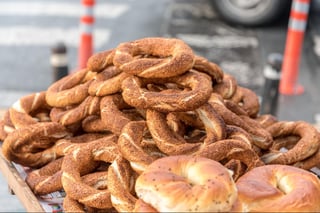9 Tips to Watch Out for 2024 Istanbul Tourist Scams
Explore Istanbul confidently by avoiding common tourist scams. In this vibrant city of 15 million, be cautious of scams like missing change and scenic taxi routes. Stay incident-free by staying aware, especially in tourist-packed areas like Sultanahmet and Taksim.

Beware of Deceptive Shoe Cleaning in Istanbul
In the bustling streets of Istanbul, a seemingly helpful encounter can turn into a scam. Picture this: an older man drops his cleaning brush, you kindly alert him, and he offers to clean your shoes in gratitude. However, what appears as a gesture of thanks quickly transforms into a scheme as he demands payment for the unexpected service. Don't be fooled by this classic Istanbul scam; stay vigilant while exploring the city's historic streets."
A Common Istanbul Tourist Trap - The Carpet Sales Ploy
Among Istanbul's bountiful sights, visitors may encounter eager locals hoping to demonstrate Turkish hospitality through rather aggressive hospitality. Common scam involves:
- Diversion and Deception
These men often approach tourists in tourist areas, appearing friendly and helpful. They may offer unsolicited advice or directions, ultimately aiming to steer tourists towards their "family-run" carpet shop.
- Coercion through Hospitality
Once inside the shop, tourists are offered complimentary tea, creating a sense of obligation and hospitality. This hospitality is then exploited as tourists are pressured into viewing expensive carpets and subjected to high-pressure sales tactics.
- Difficulty in Refusal
Tourists often feel obligated to comply with the shopkeeper's requests due to cultural norms and the expectation of reciprocating hospitality. This makes it difficult for them to refuse viewing the carpets, even if they are uninterested. The high-pressure sales tactics then exploit this hesitancy to pressure them into making a purchase.
- Recognizing the Trap
While many locals are genuinely friendly and helpful towards tourists, it is important to be cautious of those who approach with unsolicited offers and promises of shortcuts. These individuals might be trying to lure tourists into scams like the carpet sales ploy.
- Avoiding the Trap
Tourists can protect themselves from this scam by being firm and polite but assertive in declining unwanted offers and detours. Maintaining spatial awareness and staying on intended routes helps them avoid being led into unfamiliar situations.
Avoiding Istanbul Taxi Fare Hiking Tactics
Hailing taxis in Istanbul often elicits two-sided experiences where honest drivers coexist alongside petty opportunists seeking to exploit tourists through shady overcharging ploys. Common trick involves:

- Awareness of Fare Manipulation
While many taxi drivers in Istanbul are honest and reliable, some may attempt to overcharge tourists through various tactics. These tactics can include taking longer routes, claiming fake road closures, or tampering with metres.
- Prior Preparation
Before hailing a taxi, it's important to research the standard fare for your intended destination. This can be done by consulting with hotel concierge or locals. Once you have this information, proactively tell the driver what you expect to pay, making them aware that you are aware of the standard fare.
- Identifying Overcharging Tactics
If the driver initially agrees to the standard fare, pay close attention to the route they take. If they start to detour or claim that there is a road closure, be suspicious. In most cases, these claims are false, especially when it comes to the Galata Bridge which rarely closes.
- Confronting Overcharging
If you suspect that you are being overcharged, don't be afraid to speak up. Calmly point out to the driver that you are aware of the correct fare and that you expect them to charge you accordingly. If the driver refuses to comply, you have the right to refuse to pay the inflated fare and even get out of the taxi and find another one.
- Collective Action for Market Correction
Tourists who are aware of the common tricks used by scammers and who are willing to confront them can help to improve the overall experience for everyone by encouraging market self-correction. This can be done by reporting incidents to authorities, leaving negative reviews online, and sharing their experiences with other travellers.
Avoiding Istanbul's Notorious Nightlife Tourist Traps
Explore Istanbul's authentic local scene by seeking recommendations from residents, steering clear of crowded tourist hotspots, and opting for hidden gems off the beaten path to avoid the city's notorious nightlife tourist traps.
- Beware of Overly Eager Hosts
Tourists seeking nightlife experiences may be approached by individuals claiming to offer exclusive access to parties and clubs.These individuals may appear excessively friendly and eager to help, but their true motive is often financial gain.
- Price Deception
Once inside a club, these individuals may pressure tourists into ordering multiple rounds of drinks without disclosing the true cost. Tourists may become intoxicated before realising the exorbitant prices of their drinks, leading to a shocking final bill.
- Abandonment and Intimidation
When confronted about the inflated bill, the individuals may quickly disappear, leaving the tourist alone with the bill and facing pressure from staff to pay. This can leave tourists feeling vulnerable and intimidated, unsure how to proceed.
- Choosing Safer Options
While Istanbul offers a vibrant and safe nightlife scene, it's important for tourists to exercise caution. Instead of relying on unsolicited offers, choose reputable venues frequented by locals.Be wary of situations where language barriers or cultural differences make it difficult to understand pricing or intentions.
- Trust Your Instincts
If an encounter feels too good to be true or pushes you outside your comfort zone, trust your instincts and politely decline. Don't be afraid to walk away from situations that feel suspicious or unsafe.
Outsmarting Istanbul Eateries' Sly Overcharging Tactics
Beyond magical views and sumptuous dishes enthralling diners, Istanbul's vibrant restaurant scene harbours petty opportunists leveraging sly tricks to overcharge distracted patrons. Frequent plot involves:

- Distracting Show and Hospitality
While enjoying live entertainment and Turkish hospitality, diners may be more distracted and less likely to pay close attention to their bills and change. This creates an opportunity for unscrupulous waiters to pocket extra money by confusing customers with change calculations.
- Change Confusion and Intimidation
When paying with a large bill for a small meal, servers may intentionally miscalculate the change, pocketing the difference and claiming they provided the correct amount. Tourists, feeling intimidated by the language barrier and cultural context, may hesitate to challenge the waiter's claims and end up paying more than they agreed upon.
- Precautionary Measures
To avoid being overcharged, tourists should always verify their change immediately upon receiving it, regardless of the ongoing entertainment or staff interactions. If they suspect they have been shortchanged, they should politely clarify the discrepancy and request verification through receipts or by speaking to a manager. Alternatively, tourists can preempt any confusion by tendering exact cash amounts or using card payments to cover the fixed meal cost without needing change.
- Trust Numbers, Not Words
Even in a captivating cultural atmosphere, it's crucial to prioritise clear financial transactions. Tourists should rely on concrete numbers displayed on receipts rather than trusting verbal assurances from waiters. By maintaining vigilance and questioning discrepancies, they can prevent unscrupulous individuals from imposing unauthorised prices.
- Ethical Practices and Tourist Responsibility
While overcharging scams exist, it's important to remember that most Istanbul restaurants operate ethically and uphold fair business practices. However, tourists have a responsibility to be aware of potential scams and take precautions to protect themselves from being overcharged. By being vigilant and proactive, they can contribute to a fairer and more transparent dining experience for everyone.
Beware of the Simit Scam: Istanbul's Theatrical Street Trick
As you wander through Istanbul's charming streets, the irresistible aroma of simit, Turkey's sesame bread, fills the air. However, don't be swayed by the following tricks:

- The Bait
Tourists are lured in by the irresistible aroma of freshly baked simit, a popular Turkish sesame bread. As they approach the vendor, they witness a dramatic scene: the vendor pretends to fall and injure themselves.
- Exploiting Sympathy
The staged injury is intended to evoke sympathy and generosity from onlookers. The vendor expects passersby to offer help, often in the form of money.
- The Trap
This elaborate act is not a genuine cry for help, but a calculated scam designed to trick tourists into parting with their money. The vendor relies on the human instinct to aid those in need, regardless of the situation's legitimacy.
- Resisting the Urge
It's crucial to resist the urge to offer financial assistance in this staged scenario. While helping those in genuine need is commendable, this situation is designed to exploit the kindness of tourists.
- Distinguishing Real Need
Not all situations requiring assistance are scams. Tourists should be able to discern genuine hardship from manipulative tactics like the Simit Scam. Observing the context and seeking additional information can help distinguish between legitimate and staged scenarios.
- Choosing Scepticism
When encountering such theatrical acts, prioritise caution over immediate emotional response. Maintaining a healthy dose of scepticism and avoiding spontaneous generosity can help tourists avoid being scammed. Opting for scepticism instead of simit ensures they don't fall victim to this well-worn trick.
Watch Out for Unexpected Charges in Istanbul
In the vibrant city of Istanbul, a prevalent scam involves adding items to your bill that you presumed were complimentary.
Be cautious when anything arrives at your table that you didn't individually order, as it might come with a significant cost. While meze is typically complimentary, it's not a guarantee in every restaurant, so it's advisable to inquire.
Even at ocakbasi, a traditional Turkish grill restaurant, seemingly free items like water may end up on your bill. The same applies to bars, where a bowl of nuts accompanying your drinks may not be as complimentary as it appears.
Always scrutinise your bill carefully upon its arrival, questioning any discrepancies to avoid falling victim to this deceptive practice.
Beware of the Police Officer Impersonation Scam in Turkey
Picture this: you're going about your day when someone, claiming to be a police officer, suddenly appears and demands to inspect your passport and wallet. Hold on tight! Legitimate law enforcement isn't interested in your cash.
Surrender your belongings, and you risk losing your money or witnessing the imposter sprint away. Remember this crucial rule while travelling: your wallet stays with you, no exceptions.
For identification purposes, a photocopy of your passport should suffice when dealing with a genuine law enforcement officer.
If you encounter a suspicious "officer" demanding your possessions, be cautious. The only running you should be doing is through proper verification channels. Stay vigilant, keep your wits about you, and safeguard your wallet to steer clear of this impersonation con.
Beware of the Drink Deception in Turkey
Let's delve into a deceptive tactic circulating in Turkey, particularly in popular tourist areas.
- Counterfeit Alcohol
This statement highlights the potential danger of counterfeit alcohol in some Turkish bars, particularly those struggling financially. Counterfeit alcohol can contain harmful substances posing health risks to consumers.
- Tasting Off
This emphasises the importance of trusting your senses. Any drink that tastes strange, especially if it deviates significantly from what you expect, should be sent back immediately. Dismissing it as "local flavour" could lead to consuming harmful counterfeit alcohol.
- Warnings and Reputation
Tourists should be wary of bars with negative reputations circulating among locals or fellow travellers. These warnings often indicate potential scams, including serving counterfeit or diluted drinks.
- Watered-Down Drinks
This point uses an analogy to illustrate how some bars dilute higher-priced drinks like whiskey. This means tourists pay for a full drink but receive a significantly weaker one, essentially getting ripped off.
- Detecting and Addressing the Scam
This encourages tourists to be proactive in detecting watered-down drinks. If they suspect dilution, they should politely confront the server, explain their concern, and demand the full-strength drink they paid for.
- Refusal and Alternatives
This metaphorical statement emphasises the importance of standing up for yourself and not accepting subpar products. Tourists should not feel pressured to accept diluted drinks or scams. They have the right to refuse such offerings and seek alternative establishments with better practices.
FAQS
What is the first Pesky Istanbul tourist scam to watch out for in 2024?
The "Great Shoe Cleaning Scam," where a seemingly grateful man offers to clean your shoes and then charges you for the service.
How can tourists avoid falling victim to the Simit Scam in Istanbul?
Stay cautious of the theatrical performance involving a bread-seller's staged fall, designed to evoke sympathy and solicit money. Keep walking and resist the urge to be a good Samaritan in this orchestrated act.
What is a common scam involving unexpected charges in Istanbul, and how can tourists protect themselves?
The scam involves items being added to your bill that you assumed were complimentary. To avoid this, scrutinise your bill carefully upon arrival, questioning any discrepancies, and be cautious when anything arrives at your table that you didn't individually order.
Explain the "Officer" Impersonator Ruse and how tourists can protect themselves.
The scam involves someone claiming to be a police officer, demanding to see your passport and wallet. To protect yourself, remember that genuine law enforcement officers do not seek to inspect your cash. Keep your wallet with you, and verify the identity of any dubious "officer."
What is the Booze Bamboozle, and how can tourists avoid falling victim to it?
The Booze Bamboozle involves bars in Turkey serving fake alcohol or watered-down drinks. Tourists can protect themselves by being attentive to the taste of their drinks, sending back suspicious concoctions, and heeding warnings about specific establishments circulating in the rumour mill.
